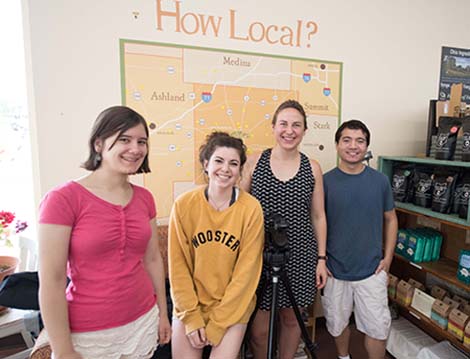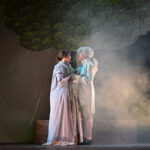
Wooster Students Develop Downtown Walking Tour on Local Food History

WOOSTER, Ohio – Over the past dozen years or so, downtown Wooster has developed a reputation as a culinary destination, as travel writers and food bloggers discover the delights of dozens of locally owned restaurants, bakeries, markets, breweries, and more. Each of those enterprises is not only part of a larger ecosystem of locally sourced and produced food, but part of Wooster’s rich history as well. This summer, a student research team, guided by Jordan Biro-Walters, assistant professor history, set out to develop a multimedia local food history walking tour of downtown, as part of the ongoing Wooster Digital History Project. The result is as thought-provoking as it is mouth-watering.
The tour begins with a “time capsule” stop devoted to the Lenape Nation, who inhabited the upper Ohio River valley before the era of European settlement. It then proceeds to seven present-day locations: Meatheads Union of Ohio, City Square Steakhouse, Broken Rocks Café and Bakery, the downtown Wooster farmers’ market, the Old Jaol, Local Roots Market and Café, and Spoon Market and Deli. Each stop combines carefully researched and written text with photos and links to relevant sources. Four include oral history video interviews with the founders and proprietors: Adam Nussbaum from Meatheads, Glen Grumbling from Broken Rocks, Betsy Anderson from Local Roots, and Mike Mariola of City Square.
Each stop contains a wealth of information, from the origins of the modern local food movement and the history of farmers’ markets and food co-ops, to the prior occupants of the buildings that house each establishment. Senior history major Spencer O’Keefe’s research revealed that the Germania Hall building, which today houses City Square Steakhouse, was the first home of Freedlander’s department store, a mainstay of downtown Wooster for more than a century, while a much-smaller Wooster Brush Company was once located in the building where Meatheads now provides choice cuts of beef, pork, and a dizzying array of sausages.
In the oral history clips, Adam Nussbaum recalls the success of the community crowdfunding initiative that helped launch his butcher shop as an independent enterprise, and Betsy Anderson talks about how a food co-op helps support local farmers by providing another outlet in which to sell their produce after seasonal outdoor markets have closed. Mike Mariola and Glen Grumbling offer their perspectives as chefs as well as a restaurant owners on the importance of high-quality, locally sourced ingredients.
“We had to think carefully about the audience we were writing for,” said Abigail Blinka, another senior history major and political science minor who wrote copy for the Lenape stop. “It’s not an academic audience, so there’s a delicate balance between writing simply enough for an everyday reader, while still being academically rigorous” about the content itself.
Since Blinka had taken “a couple of photography classes” and was the only member of the team with any video editing experience, she shot half the oral history interview footage and did all the editing. Katarina Padavick, a senior English and history double major, shot the other half.
One question that interested the team, O’Keefe said, was the connection between local and organic – or lack thereof – in people’s minds. According to Padavick, it became clear during the course of their research and interviews that “for the vast majority of people in this community, it’s more important that their food be locally grown than organic.” It’s a question of loyalty and trust, of “being buds with the dude who sells you your green beans and corn.”
From research techniques to video editing, the whole effort was a tremendous learning experience, said sophomore history major Sophia Biegelseisen. “I learned a lot of oral history skills,” she said, “from persuading people to participate to the technical part of recording to how to pose good questions.”
Posted in News on July 30, 2018.
Related Posts
Related Areas of Study
History
Critically examine events and societies of the past and learn to tell the stories future generations need to know
Major Minor

